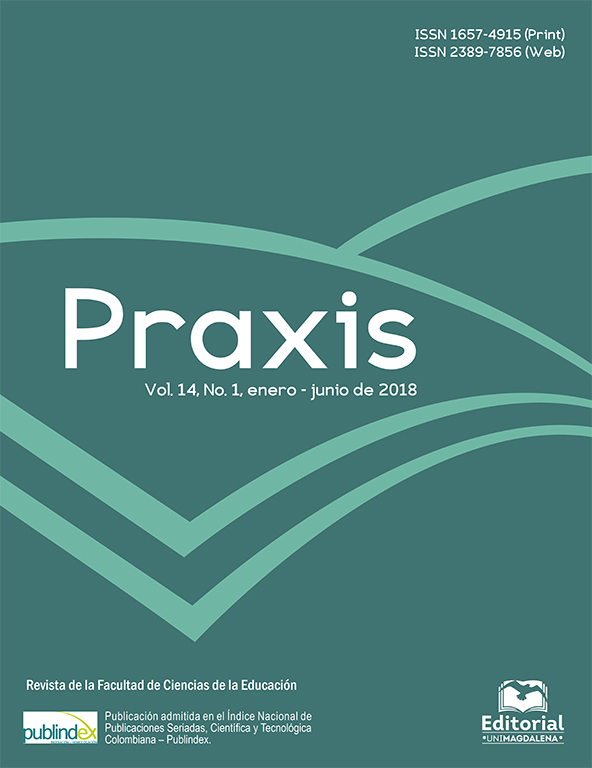Abstract
This article is the result of a research project carried out to analyze the way literacy difficulties of children with Transitory Educative Needs (TEN) influence their academical performance and social interaction. A mixed methodology was followed by applying a test designed by Instituto para la Investigación y el Desarrollo (IDEP) in its quantitative phase, and the observation with a low structuration level in its qualitative phase. This research results allowed to detect students’ difficulties in relation to their oral comprehension and expression, as well as in the written code and in the interaction with pairs and adults. Furthermore, it was evidenced that these difficulties affect the performance in other areas of knowledge and thus in the academic results. The study provides tools to detect, to give answers and to intervene through pedagogical strategies in the cases of students that have not reached the language development level according to their age and course.References
Acosta, M. (2006). El aprendizaje visto como un proceso de interacción social. La perspectiva Vygotskiana vista desde la complejidad. Revista Ciencias de la Educación, 1(27), 123-134. Recuperado de http://servicio.bc.uc.edu.ve/educacion/revista/volIn27/27-8.pdf
Alonso, L. (2000). El papel del lenguaje interior en la regulación del comportamiento, EDUCERE, 3(9), 61-68. Recuperado de www.saber.ula.ve/bitstream/123456789/19512/1/articulo9-4-9.pdf
Aguirre, R. (2000). Dificultades de aprendizaje de la lectura y la escritura EDUCERE, 4(11), 147-150. Recuperado de www.redalyc.org/articulo.oa?id=35601102
Blanco, Y., Zea, L., Ortíz, G., León, J., Albarracín, L., Amaya, G.,…Acuña, L. (2015). Desarrollo y aprendizaje en el ciclo inicial: Valoración y abordaje pedagógico Una reflexión a partir de la experiencia. Bogotá, Colombia: Instituto para la Investigación Educativa y el Desarrollo Pedagógico (IDEP), Cooperativa Editorial Magisterio.
Briones, G. (2006). Teorías de las ciencias sociales y de la educación: Epistemología. México D F.: Ed. Trillas.
Celdrán, M. y Zamorano, F. (2011). Dificultades en la adquisición de la lecto-escritura y otros aprendizajes. Recuperado de http://diversidad.murciaeduca.es/orientamur/gestion/documentos/unidad24.pdf
Grañeras, M. y Parras, A. (Coords.). (2008). Orientación educativa: fundamentos teóricos, modelos institucionales y nuevas perspectivas. España: CIDE.
León, S. (2007). Abordaje de los procesos de lectura y escritura en una escuela: propuesta pedagógica en y para la diversidad. Revista Electrónica Educare, 1, 65-88. Recuperado de http://www.redalyc.org/articulo.oa?id=194119235005
Lomas, C. (2013). Aprender a comunicar(se) en las aulas. Recuperado de: http://rabida.uhu.es/dspace/bitstream/handle/10272/3508/b15760844.pdf?..
Luque, D. (2009). Las necesidades educativas especiales como necesidades básicas. Una reflexión sobre la inclusión educativa. Revista Latinoamericana de Estudios Educativos, XXXIX(3-4), 202-223. Recuperado de http://www.redalyc.org/articulo.oa?id=27015078009
Ochoa, L. (2008). Leer y escribir correctamente: La gramática y su relación con la lectura y la escritura. Revista del Instituto para la Investigación Educativa y el Desarrollo Pedagógico (IDEP), (15), 9-20.
Pinto, A., Olivera, E. y Fuentes, R. (2008). Modelo de gestión curricular de la escuela para el logro de aprendizajes significativos de estudiantes con necesidades educativas especiales transitorias basado en articulaciones efectivas desde el Lenguaje. (Informe final, Proyecto FONIDE No. 000231). Maule, Chile.
Alonso, L. (2000). El papel del lenguaje interior en la regulación del comportamiento, EDUCERE, 3(9), 61-68. Recuperado de www.saber.ula.ve/bitstream/123456789/19512/1/articulo9-4-9.pdf
Aguirre, R. (2000). Dificultades de aprendizaje de la lectura y la escritura EDUCERE, 4(11), 147-150. Recuperado de www.redalyc.org/articulo.oa?id=35601102
Blanco, Y., Zea, L., Ortíz, G., León, J., Albarracín, L., Amaya, G.,…Acuña, L. (2015). Desarrollo y aprendizaje en el ciclo inicial: Valoración y abordaje pedagógico Una reflexión a partir de la experiencia. Bogotá, Colombia: Instituto para la Investigación Educativa y el Desarrollo Pedagógico (IDEP), Cooperativa Editorial Magisterio.
Briones, G. (2006). Teorías de las ciencias sociales y de la educación: Epistemología. México D F.: Ed. Trillas.
Celdrán, M. y Zamorano, F. (2011). Dificultades en la adquisición de la lecto-escritura y otros aprendizajes. Recuperado de http://diversidad.murciaeduca.es/orientamur/gestion/documentos/unidad24.pdf
Grañeras, M. y Parras, A. (Coords.). (2008). Orientación educativa: fundamentos teóricos, modelos institucionales y nuevas perspectivas. España: CIDE.
León, S. (2007). Abordaje de los procesos de lectura y escritura en una escuela: propuesta pedagógica en y para la diversidad. Revista Electrónica Educare, 1, 65-88. Recuperado de http://www.redalyc.org/articulo.oa?id=194119235005
Lomas, C. (2013). Aprender a comunicar(se) en las aulas. Recuperado de: http://rabida.uhu.es/dspace/bitstream/handle/10272/3508/b15760844.pdf?..
Luque, D. (2009). Las necesidades educativas especiales como necesidades básicas. Una reflexión sobre la inclusión educativa. Revista Latinoamericana de Estudios Educativos, XXXIX(3-4), 202-223. Recuperado de http://www.redalyc.org/articulo.oa?id=27015078009
Ochoa, L. (2008). Leer y escribir correctamente: La gramática y su relación con la lectura y la escritura. Revista del Instituto para la Investigación Educativa y el Desarrollo Pedagógico (IDEP), (15), 9-20.
Pinto, A., Olivera, E. y Fuentes, R. (2008). Modelo de gestión curricular de la escuela para el logro de aprendizajes significativos de estudiantes con necesidades educativas especiales transitorias basado en articulaciones efectivas desde el Lenguaje. (Informe final, Proyecto FONIDE No. 000231). Maule, Chile.
Downloads
Download data is not yet available.


